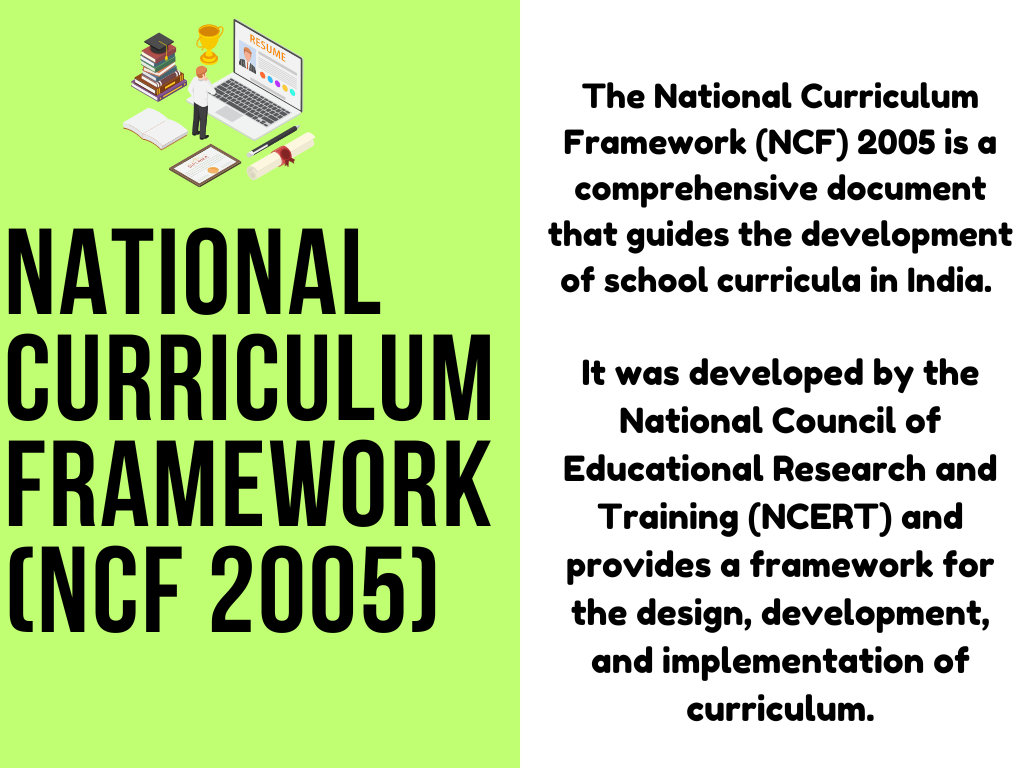The National Curriculum Framework (NCF) 2005 for elementary level is a comprehensive document that guides the development of school curricula in India. It was developed by the National Council of Educational Research and Training (NCERT) and provides a framework for the design, development, and implementation of curricula at different levels of education, from pre-school to higher secondary.
The NCF 2005 is based on the principles of constructivist learning theory, which emphasizes that learning is an active, constructive, and collaborative process. It also emphasizes the need for a learner-centered approach to curriculum development that is responsive to the needs and interests of students, and promotes critical thinking, creativity, and problem-solving.
The NCF 2005 is organized into four sections:
- Introduction: This section provides an overview of the purpose and scope of the NCF 2005, and discusses the key principles and values that underpin the framework.
- Theoretical Perspectives: This section presents a detailed discussion of the theoretical perspectives that inform the NCF 2005, including constructivist learning theory, multiple intelligences theory, and socio-cultural theory.
- Curriculum Areas: This section provides guidelines for the development of curricula in specific subject areas, such as languages, mathematics, science, social sciences, and art and culture. It emphasizes the need for an interdisciplinary approach to learning that encourages connections between different subject areas.
- Conclusion: This section summarizes the key principles and values of the NCF 2005, and emphasizes the need for a learner-centered approach to curriculum development that is responsive to the needs and interests of students.
The NCF 2005 emphasizes the need for a flexible and adaptable curriculum that can respond to the changing needs of students and society. It also emphasizes the importance of continuous evaluation and feedback to ensure that the curriculum remains relevant and effective.
NCF 2005 objectives for elementary level
The objectives of the National Curriculum Framework (NCF) 2005 for the elementary level of education are as follows:
- To promote a child-centered approach to education: The NCF 2005 emphasizes the need for a curriculum that is responsive to the needs and interests of children, and promotes active and participatory learning.
- To promote the development of foundational skills: The NCF 2005 emphasizes the importance of developing foundational skills in language, mathematics, science, and social studies.
- To promote the development of creativity and innovation: The NCF 2005 recognizes the importance of nurturing creativity and innovation among children and emphasizes the need for a curriculum that encourages children to think creatively and express themselves in a variety of ways.
- To promote the development of values: The NCF 2005 emphasizes the importance of promoting values such as respect for diversity, honesty, and social responsibility among children.
- To promote the integration of knowledge across different subject areas: The NCF 2005 emphasizes the need for an interdisciplinary approach to learning that promotes connections between different subject areas and encourages children to make connections between their learning and the world around them.
Also Visit : Prep with Harshita

Also Read : Curriculum of NCERT and SCERT

